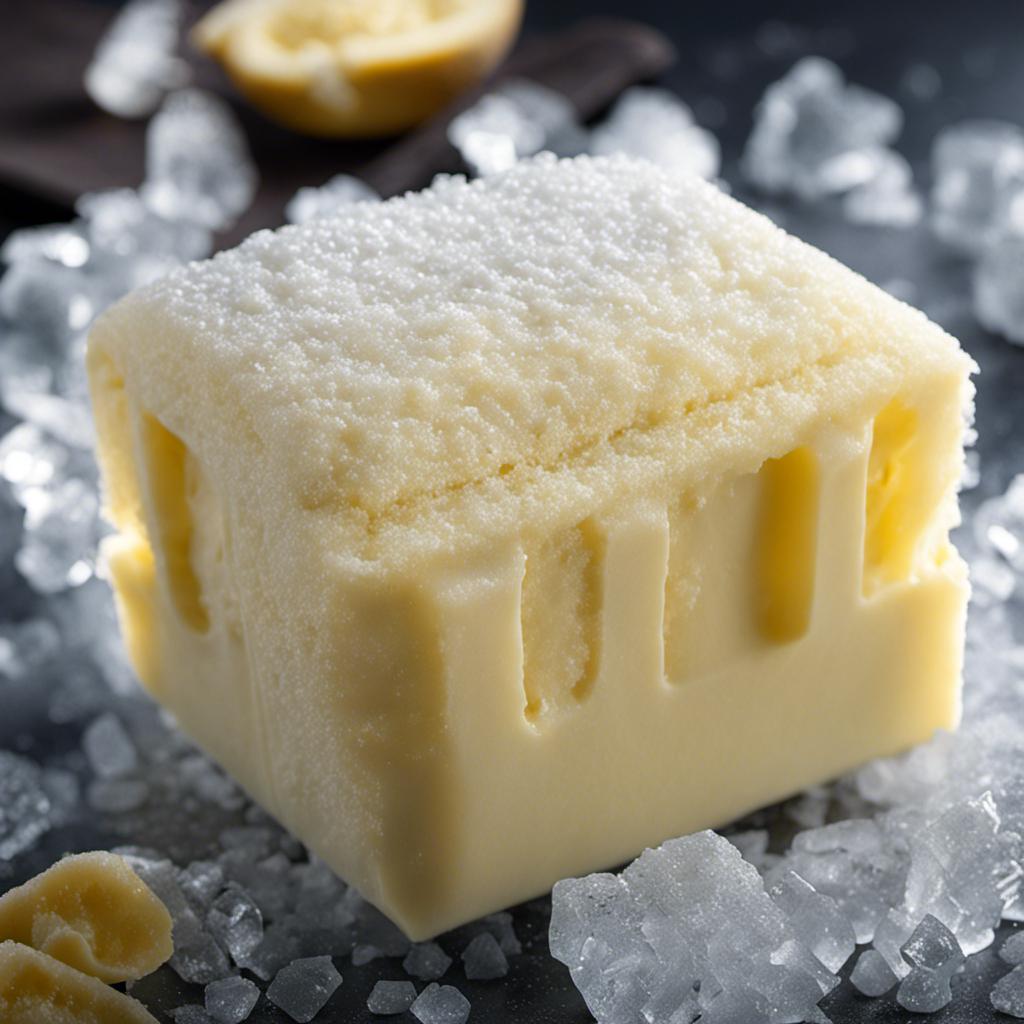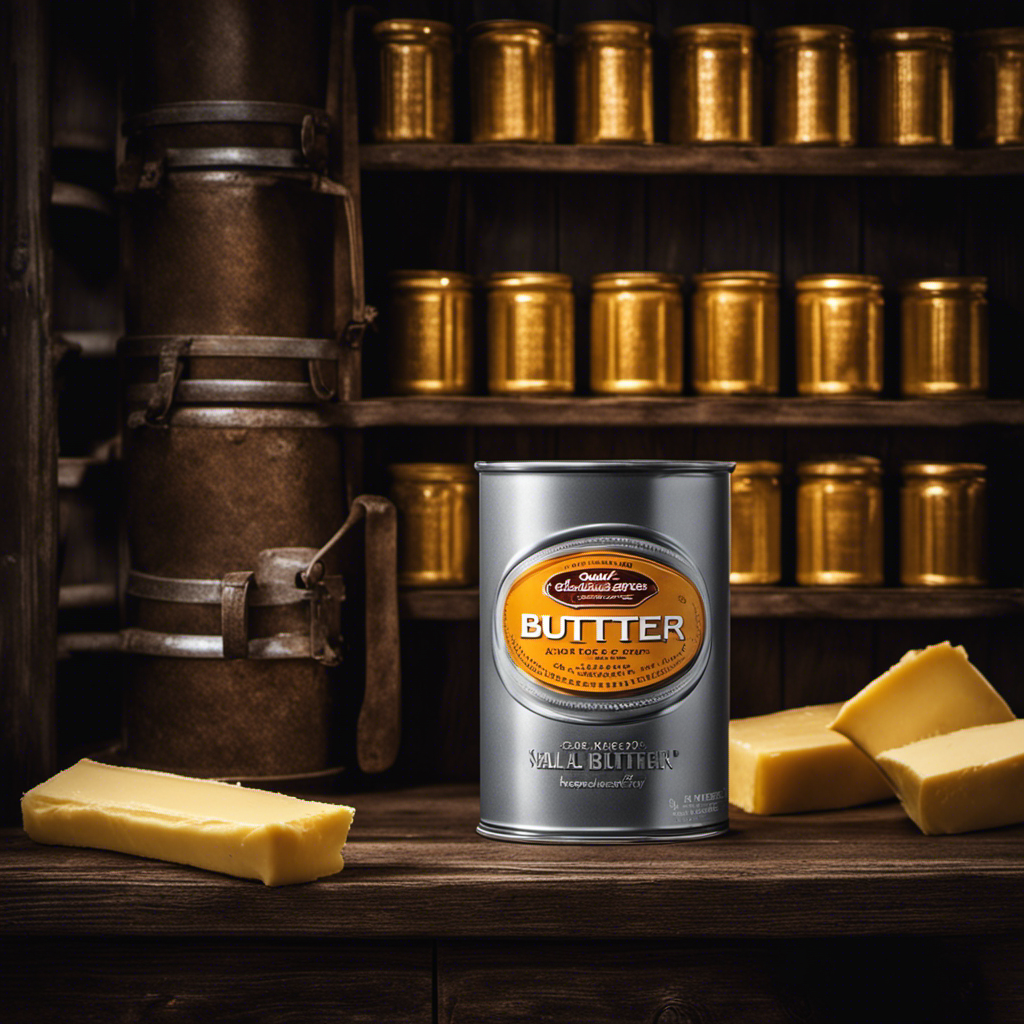I will always remember the day I learned the trick to keeping butter fresh and tasty for months. It completely changed the way I cook, and now I want to pass this knowledge on to you.
In this article, we will explore the factors that affect the shelf life of frozen butter, recommended storage times, signs of spoiled butter, and tips for properly freezing and extending the life of this delectable ingredient.
Get ready to unlock the untapped potential of frozen butter!
Key Takeaways
- Temperature below 0°F (-18°C) is crucial for maintaining quality of frozen butter
- Tightly wrap butter to prevent air exposure and freezer burn
- The recommended storage time for frozen butter is typically around six months
- Thaw frozen butter in the refrigerator overnight before using
Factors Affecting the Shelf Life of Frozen Butter
Factors like temperature and packaging can affect how long you can keep frozen butter. The quality and shelf life of frozen butter depend on various factors, including the storage method and the impact of temperature.
When it comes to butter storage methods, it is important to keep it tightly wrapped to prevent air exposure and freezer burn. Freezing butter at temperatures below 0°F (-18°C) is crucial for maintaining its quality. If the temperature rises above this threshold, the butter can become rancid or develop off-flavors.
Additionally, fluctuations in temperature can cause condensation, leading to moisture build-up and deterioration of the butter’s texture and taste. Therefore, it is essential to store frozen butter in a consistently cold environment to maintain its quality for an extended period.
Recommended Storage Time for Frozen Butter
The recommended storage time for frozen butter is typically around six months. It’s important to keep butter properly stored to maintain its quality and prevent it from going bad. Freezing butter can help extend its shelf life, but there are a few things to keep in mind. Firstly, the optimal temperature for freezing butter is below 0 degrees Fahrenheit (-18 degrees Celsius). This ensures that the butter stays solid and doesn’t develop any off-flavors. Secondly, when using frozen butter in recipes, it’s best to thaw it in the refrigerator overnight before using. This helps the butter retain its texture and makes it easier to incorporate into your dishes. Lastly, frozen butter can be used in a variety of creative recipes, such as flaky pie crusts, buttery biscuits, or even as a topping for grilled meats. So don’t let your extra butter go to waste – freeze it and get creative in the kitchen!
| Optimal Temperature for Freezing Butter | Creative Recipes using Frozen Butter |
|---|---|
| Below 0 degrees Fahrenheit (-18 degrees Celsius) | Flaky pie crusts |
| Buttery biscuits | |
| Topping for grilled meats |
Signs of Spoiled Frozen Butter
If your frozen butter is showing signs of spoilage, such as an off smell or mold growth, it’s best to discard it to avoid any foodborne illnesses.
Signs of rancid butter include a strong, unpleasant odor, a yellow or brown color, and a sour taste.
Freezer burn is another common issue with frozen butter, which occurs when the butter is exposed to air and moisture. This can result in dry, discolored patches on the surface.
To prevent freezer burn, make sure the butter is tightly wrapped in airtight packaging, such as plastic wrap or freezer bags. It’s also important to store the butter in the coldest part of the freezer.
By properly freezing your butter, you can extend its shelf life and maintain its quality for longer periods.
Now, let’s move on to some tips for properly freezing butter.
Tips for Properly Freezing Butter
To maintain the quality of your frozen butter, it’s essential to tightly wrap it in airtight packaging and store it in the coldest part of the freezer. Here are some tips to help you properly freeze your butter:
-
Use airtight packaging: Wrap the butter in plastic wrap or place it in a freezer-safe container to prevent freezer burn and maintain its freshness.
-
Label and date: Don’t forget to label the packaging with the date of freezing. This will help you keep track of how long the butter has been in the freezer.
-
Butter storage alternatives: If you don’t have space in your freezer, you can also store frozen butter in the refrigerator for up to a month. Just make sure it’s tightly wrapped to prevent odors from seeping in.
-
Creative uses for frozen butter: Frozen butter can be used for baking, making sauces, or even spreading on toast. It adds a lovely richness to your dishes.
Extending the Shelf Life of Frozen Butter
When properly stored, frozen butter can last for several months in the freezer. To extend the shelf life of frozen butter, there are a few butter storage hacks you can try.
First, make sure to wrap the butter tightly in plastic wrap or place it in an airtight container to prevent freezer burn. You can also divide the butter into smaller portions before freezing, so you can thaw only what you need. Additionally, labeling the butter with the date of freezing can help you keep track of its freshness.
Now, let’s talk about some creative uses for frozen butter. Besides using it for baking and cooking, frozen butter can be grated and sprinkled over popcorn for a delicious twist. It can also be used to make flaky pie crusts or incorporated into homemade ice cream for a rich and creamy texture.
Frequently Asked Questions
Can You Freeze Flavored or Seasoned Butter?
Yes, you can freeze flavored or seasoned butter. When it comes to freezing unsalted vs salted butter, both can be frozen successfully. However, using frozen flavored butter in recipes may alter the taste slightly.
What Is the Best Way to Thaw Frozen Butter?
Proper thawing techniques ensure the best results when using frozen butter. Allowing it to come to room temperature naturally brings out its flavors and makes it easier to spread.
Can You Refreeze Butter After It Has Been Thawed?
Yes, you can refreeze butter after it has been thawed. However, it’s important to note that each time you freeze and thaw butter, it may affect its quality and shorten its overall storage lifespan.
How Can You Tell if Frozen Butter Has Gone Bad?
When frozen butter starts to smell off and develop an unusual texture, it may have gone bad. It’s best to discard it rather than risk using it for spreading.
Can Frozen Butter Be Used for Baking or Cooking Directly From the Freezer?
Using frozen butter directly from the freezer for baking or cooking has its advantages, such as easier grating and flakier pastries. Properly store and label frozen butter in airtight containers or freezer bags to maintain freshness.
Conclusion
In conclusion, the longevity of frozen butter largely relies on its storage conditions. By following proper freezing techniques and keeping it in an airtight container, you can significantly extend its shelf life.
Remember to check for any signs of spoilage, such as a rancid smell or a change in texture, before using it.
So, seize the opportunity to savor your frozen butter for an extended period, ensuring its flavor remains fresh and fabulous.
Freeze, feast, and feel fabulous with frozen butter!









